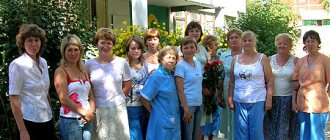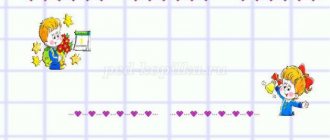Parent meeting “The importance of family traditions in parent-child relationships” - presentation
Parents' meeting "The importance of family traditions in parent-child relationships"
What are family traditions? “Family traditions are the norms, behavior patterns, customs and views accepted in the family that are passed on from generation to generation.” With a great deal of truth, we can assume that when the phrase “family traditions” is mentioned, most people have associations with the words “home”, “relatives”, “parents”, something that is unique to your family. It is precisely this “something” that can be called a family tradition. These memories are very deep in the human consciousness, since the actions that we mean by the concept of “family traditions” have been repeated many times since early childhood.
Family traditions are the spiritual atmosphere of a home, which is made up of the daily routine, customs, way of life and habits of its inhabitants.
The role of family traditions 1. Family traditions are very important for the formation of a real Family. 2. They are important for the child to feel like a representative of the Family Name, to develop a sense of security, confidence, and simply: family traditions and customs are warmth, they are values, they are eternal. And it’s not even so important what exactly will become such a family tradition: every Saturday walks in the forest, “The first snowman of the year”, celebrating the arrival of spring or joint Sunday dinners, etc. It is important that all this creates a friendly atmosphere of comfort, stability and mutual support in the family.
3. Another significant component of family traditions and customs is that the child becomes a full participant and plays a certain role. This could be the responsibility of arranging the dishes before dinner, or preparing invitations before an organized holiday - a trip to nature. The main thing is that even the smallest family member feels significant. Why not make it a habit, for example, of family reading every night before bed, and discussing what you read once a week? This way, each family member will be able to get to know each other better, learn to understand the thoughts of their relatives, and become closer and closer in intimate conversations. And if personal development occurs in the family, rest assured that you will not have problems understanding your own child when he grows up.
It is only important that family traditions are established naturally, and not under the pressure of one of the spouses. It is also important that both agree with family traditions and that they bring joy and a sense of security to both. Finally, it is important that family traditions are maintained for years, without being destroyed by momentary moods and conditions.
What are family traditions? 1. Traditions of family leisure: travel, holidays, tea parties, Sunday walks, games, etc. 2. Traditions of labor education (joint preparations, dachas, labor dynasties) 3. Maintaining family values (compiling a genealogy, visiting relatives, caring for each other) 4. Traditions of family reading Joint hobbies (hobbies) 5. Joint interests (hobbies)
Traditions of family reading In Russia there were wonderful traditions of family readings, when parents and children thought, worried, and sympathized together.
Family reading is the best form of collective communication. To revive a forgotten tradition means to return culture, mutual understanding, and the warmth of spiritual communication to the home. The family and cultural relations within it largely determine the path of the child as a reader.
Traditions of family reading Family reading - home reading pedagogy. It compensates for the lack of communication. Time devoted to the ritual of family reading will bring parents and children closer, awakening the desire to observe, think, reflect, feel and empathize. Dear mothers and fathers, grandparents! Remember the minutes spent reading as a family will stay with your child for life!
An excerpt from a children's essay It may seem funny to some, but cleaning the apartment on Saturdays is also our tradition! Each of us has our own responsibilities that suit our age. Everyone is busy with work - mom sings the floor, brother wipes the dust, and I wash the dishes and take out the trash. We always do our work in a friendly manner, with care and support.
Excerpt from a children's essay We love active recreation very much, so trips to nature are our family tradition. How wonderful it is on a cool August morning to put on a jacket, boots, jacket, pick up a stick, bucket and knife and go into the forest to pick mushrooms! You never know what kind of mushrooms and how many of them you will collect. And swimming in the river in the summer, racing down the hill in the winter with parents. What could be better?
dynasties family cleaning What traditions do you have in your family? Online survey: family reading family photo album
skiing a walk in the park What traditions do you have in your family? Internet survey: hiking and fishing
joint activities joint games What traditions do you have in your family? Online survey: joint cultural events, joint holidays
What traditions do you have in your family? Survey statistics:
Results of a survey of 6th grade students 1. What family traditions do you have in your family? 2. What holidays are celebrated in your family? 3. Do you know your ancestry?
What family traditions do you have in your family? Results of a survey of 6th grade students None Trips to the country (“transporting sand, transporting crushed stone”) Cleaning on weekends Visiting relatives Tea parties (“we tell each other about what happened during the week”) Trips to the sea, abroad “Playing board games games (lotto), watch movies" Shopping, restaurant
What family traditions do you have in your family? Results of a survey of 6th grade students “Go with dad to make a car” Every summer go to the village Do homework Active recreation, walks (“every year go hiking on the lakeshore”) Bake potato pancakes on March 8 “They kick me out into the corridor for half an hour if I start to get hysterical"
What holidays are celebrated in your family? Results of a survey of 6th grade students New Year Birthdays March 8 February 23 Parents' wedding anniversaries Easter May 9 Children's Day Old New Year Maslenitsa
Joint trips to the theater and nature, family viewing of a new children's film, trips to grandma's birthday, making gifts for her with your own hands, reading before bed, freshly baked pie on Sundays - all this creates a friendly atmosphere of comfort, stability and mutual support in the family. Create a family tradition today and who knows, maybe in a few decades your children will talk about fond memories of their childhood, and the tradition will be passed down from generation to generation.
Parent meeting in the preparatory group. Family and family traditions
Parent meeting in the preparatory group on the topic: “Family and family traditions”
Author: Knis Anna Nikolaevna, senior teacher. Place of work: MBDOU “Kindergarten No. 3 “Smile”, Kalach-on-Don. Description of work: Summary of the parent meeting on the topic: “Family and family traditions” in the preparatory group. This material can be useful for both teachers of early childhood development schools and preschool teachers. Goal : formation of family traditions. Objectives: to interest parents and children in studying the history of the origin of their family; instill respect for the cultural values of family and country; contribute to the formation of personality by studying the genealogy and life of their ancestors. Form of implementation: competitive program. Participants: parents, teachers, children. Plan of conduct 1 Introductory part. 2 Competition program. 3 Final part. Progress of the event I Preparatory stage. 1 Design of the photo album “Family Photos”, an exhibition of photographs of the group’s pupils in infancy and early childhood (photos are not signed). 2 Homework: create a pedigree of your family (family tree) and a family coat of arms. 3 Preparing a presentation of family photography. II Organizational stage. 1 Exhibition design: photographs of the group’s students, family trees, family coats of arms. 2 Wise thoughts about family are written on the easel. III Introductory part. Host: Good evening, dear parents, hello! Family means happiness, love and luck, Family means trips to the country in the summer. Family is a holiday, family dates, gifts, purchases, pleasant expenses. The birth of children, the first step, the first babble, dreams of good things, excitement and trepidation. Family is work, taking care of each other, Family is a lot of homework. Family is important! Family is difficult! But it is impossible to live happily alone! Always be together, take care of love, drive away insults and quarrels, I want your friends to say about you: What a good family this is! M. Langer Presenter: And now I invite you to take part in the “My Family” competition program. IV Competitions. 1. Family history. My pedigree (family tree). Presenter: Dear children and parents, I invite you to introduce us to the history of your family and present the family tree. 2. Family coat of arms. Host: And now the presentation of the family coat of arms.
3. Proverbs and sayings about family. Host: Proverbs and sayings about family have been collected for centuries. They contain the wisdom of the people. What proverbs and sayings about family have you prepared? 4. Warm-up with a ball (to the music, a ball or toy is passed from hand to hand, the music stops, and the family with the ball in their hands sings their favorite song or poem).
5. Funny family story. Host: Usually parents talk strictly and in a business-like manner with their children. I propose to introduce good humor and touching memories into our communication, and everyone will feel good and comfortable, and everyone will smile at each other. Remember funny stories about your family and tell us. 6. Family traditions. Host: Family tradition is what distinguishes one family from another and serves as an asset for descendants. Family traditions are norms, behavior patterns, customs and views accepted in the family that are passed on from generation to generation. What traditions have developed in your family? 7. Creative competition “Designing a family photo” (colored cardboard and paper, scissors, glue, pencils).
8. Warm up. Dance “Lavata” (teachers, parents, children). V Final part. Summarizing. Educator: Why does a modern person need to know the history of his family? Parents' answers... Conclusion: A person without this knowledge is like a leaf carried by the wind, it is easy to instill in him any truths, moral standards, it is very easy to control him. Educator: Dear parents! A tree with strong roots will not be knocked down by the wind. If we know the history of our country, kind of, we will not be afraid of any adversity. Decision of the parent meeting: 1. Maintain family traditions and create new ones. 2. Start creating a family album, family tree and family archive. Distribute instructions for parents on compiling the “Family Chronicle” album.
We recommend watching:
Parent meeting in the preparatory group. Notes Notes of the parent meeting in the preparatory group Parent meeting in the preparatory group. Psychological readiness for school Parent meeting - entertainment in a school preparatory group
Similar articles:
Parent meeting in the preparatory group “Soon to school.” Beginning of the year
Business game with parents at a parent meeting in kindergarten
Parent meeting in the preparatory group. Games with parents
Parent meeting in the preparatory group. Hyperactive child
Holiday "Family Traditions" in the senior group. Scenario
Every family has its own traditions. Parent meetingmaterial on the topic
Every family has its own traditions
Goals: to promote the observance of existing family traditions and the emergence of new ones; exchange of experience of family education and traditions; improving the pedagogical culture of parents; search for new forms of interaction between teachers and parents.
Form of holding: meeting.
Event plan
- Introduction.
- Warm up.
- Stage of the conversation “family traditions”
- Summing up the year.
- About different things.
Dear parents! Today we have gathered with you to talk about family, about family traditions and their importance in the upbringing and development of a preschool child. Before we start our conversation, I suggest you relax and play a little.
The game “Item of my childhood” objects are laid out on the table: a doll, a soft toy, a ball, a car, etc., etc. Everyone chooses an object and tells an episode from their childhood.
Parents fill out mini-questionnaires:
1. What do you think is included in the concept of “family traditions”?
2. What family traditions do you have in your family?
3. Do family traditions influence the upbringing of a child?
4. What positive character traits do they develop in the child?
Family traditions are, first of all, holidays that are celebrated by all family members and, of course, the child’s birthday; gala dinners on weekends. This could be a tradition of planting a tree, or going out of town on New Year’s Eve to decorate the Christmas tree. It is a tradition to visit exhibitions, museums, and theaters with your child. These include joint games, hikes, walks, and outings. Compiling your pedigree and family albums. Organizing family concerts.
-Do you think holidays are necessary for children in the family? (Answers)
Yes, a child needs a holiday like air for full development. A holiday for a child is not the same as for us adults. A holiday is an event in a child’s life, and a child counts his days from holiday to holiday, just as we count our years from one event to another.
-How do you organize children's parties in your family? (Answers)
Oddly enough, adults often organize children's parties for themselves. The adults have their own conversations, but the child at such a holiday is bored and offended, everyone has forgotten about him. However, if the child is left at the common table, he becomes a witness and participant in adult conversations, then he gets used to being the center of attention, which develops immodesty and swagger in him.
You should remember that too. That you should not try to force him to perform against the will of the child: to sing, recite poetry. The child himself will express a desire to sing or dance if it happens to him in the game.
— Do you think it is necessary to decorate the apartment for the holiday? What will this give the child?
Yes, it is advisable to decorate. This will create a certain mood, and it is important for both adults and children to take part in this. On birthdays, it is important to give gifts to children.
-What gifts do you give to children? (Answers)
Each toy should develop the child’s thinking, attention, and memory. It’s good to give children toys, balls, books. For the development of fine motor skills - pencils, plasticine, construction sets, mosaics, various puzzles. In this case, you should pay attention to how the child accepts the gift and how he thanks for it.
To make your child’s birthday memorable, you need to think through the program in advance: games, competitions, attractions. The success of a children's celebration depends on the invention and imagination of adults.
In many families, there is a tradition of marking the child’s growth on the door frame, so that he can see how much he has grown in a year.
2. Tradition of “compiling your family’s pedigree”
It will be very good if you and your child start collecting stories of this kind.
Plant a family tree. This will become the most precious piece of the inheritance that we must and can leave behind.
3. Tradition of “family archives”: a family should have its own archive - certificates of honor from fathers and grandfathers, stories of merit. Medals and orders.
- Tell. What can preserve the history of a family line?
- Does your family have a family album?
4. Tradition “Family Album”
This is a huge meaningful space of life. On the one hand, simple and understandable, on the other, mysterious and amazing.
— When was the last time you leafed through your family album?
5. tradition of “family recreation in nature”
6. tradition “Family visits to theaters, museums, exhibitions”
7.tradition “Collecting”
— What can a family collect? (cones, stones, shells, stamps, candy wrappers, beads)
It is in our hands to raise children to be literate, kind, educated, well-mannered, loving and respectful not only of their parents, but also of everything that connects them with the distant past.



